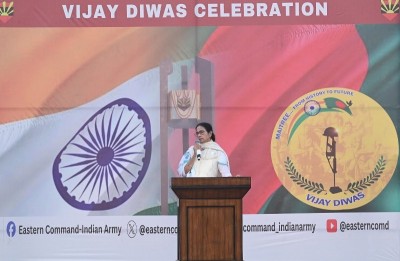
President of India inaugurates Constitution Day celebrations
New Delhi, Nov 26 (IBNS): President of India Ram Nath Kovind inaugurated the Constitution Day celebrations, organised by the Supreme Court, to mark the anniversary of the adoption of our Constitution on on Monday in New Delhi.
Speaking on the occasion, the President said that the Constitution is the modern scripture of independent India. It is our suprema lex.
However, it is more than just a collection of articles and clauses. For us Indians it is an inspirational and living document, an ideal of the society we are and the even better society we are striving to be.
The President said that Dr B. R. Ambedkar and his colleagues in the Constituent Assembly were remarkably large-hearted and generous in their approach.
They allowed for flexibility in amending the Constitution and were accommodative of various streams of thought.
Above all, they trusted the wisdom of future generations to expand the frontiers of freedom and liberty, justice and fraternity, fairness and equality.
They trusted future generations to not just amend the Constitution’s text, but to constructively re-imagine and re-interpret it for changing times.
"If we continue to be true to this spirit, the Constitution can serve India for all times to come," Kovind said.
The President said that the people of India are the ultimate custodians of the Constitution. It is in them that sovereignty vests and it is in their name that the Constitution was adopted.
The Constitution empowers the citizen, but the citizen too empowers the Constitution – by following it, by adhering to it, by protecting it, and by persevering to make it more meaningful with words and deeds. The Constitution is nobody’s preserve – and it is everybody’s preserve.
The President said that perhaps the most moving word in the Constitution is “justice”. “Justice” is a single word. “Justice” is a complex and liberating expression.
And “justice” is both the means and the goal of our constitutional and nation-building process. Justice must also be seen in a wider context – in terms of society’s evolution and its changing beliefs, lifestyles and technologies.
The President said that given the diverse history of our people, and given imbalances and hierarchies that have sometimes marked our past, social justice remains a touchstone of our nation building.
At the simplest level, it implies the removal of societal imbalances and the harmonisation of rival claims and needs of different communities and groups. Social justice is about providing equal opportunities.
Such a conceptualisation of justice was valid in 1949 and broadly remains relevant today. Even so, the 21st century has brought new challenges.
No doubt the concept of justice - political, economic and social – has a resilient core but it needs to be thought of in innovative ways. It requires to be applied afresh to emerging situations – situations that may not have existed or been foreseen when our Constitution framers were at work.
The President said that in India, the idea of social justice too has expanded to encompass modern civic parameters – such as clean air; less polluted cities and towns, rivers and water bodies; sanitary and hygienic living conditions; and green and eco-friendly growth and development.
These are all implications of environmental and climate justice, within the framework of social justice. If a child suffers from asthma due to air pollution it would be considered a gap in providing social justice.
The President said that perhaps the most tantalising influence on justice is that of technology. Technology is an enhancer of justice as well as a challenge.
It calls for us to think of technology justice as a subset of economic justice. This is very true in the context of access to technology for our poorer and less-privileged fellow citizens.
The President said that innovation has also worked for the benefit of disadvantaged sections of society. A case in point is India’s experience with technology-enabled, Aadhar-linked direct benefit transfers. These have plugged corruption, leakages and exclusion from India’s welfare programmes.
The President said that innovation and technology have brought gains. But they have also brought questions of access and privacy. For example, there is the dilemma of weighing data privacy against the use of data for the greater common good. Within these competing imperatives lie competing notions of justice. And such issues will probably stay with us through the 21st century.
Support Our Journalism
We cannot do without you.. your contribution supports unbiased journalism
IBNS is not driven by any ism- not wokeism, not racism, not skewed secularism, not hyper right-wing or left liberal ideals, nor by any hardline religious beliefs or hyper nationalism. We want to serve you good old objective news, as they are. We do not judge or preach. We let people decide for themselves. We only try to present factual and well-sourced news.







